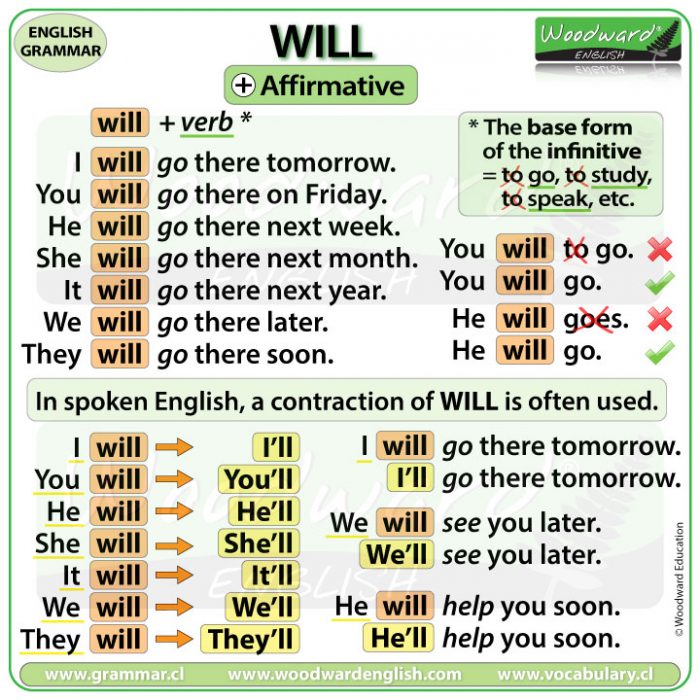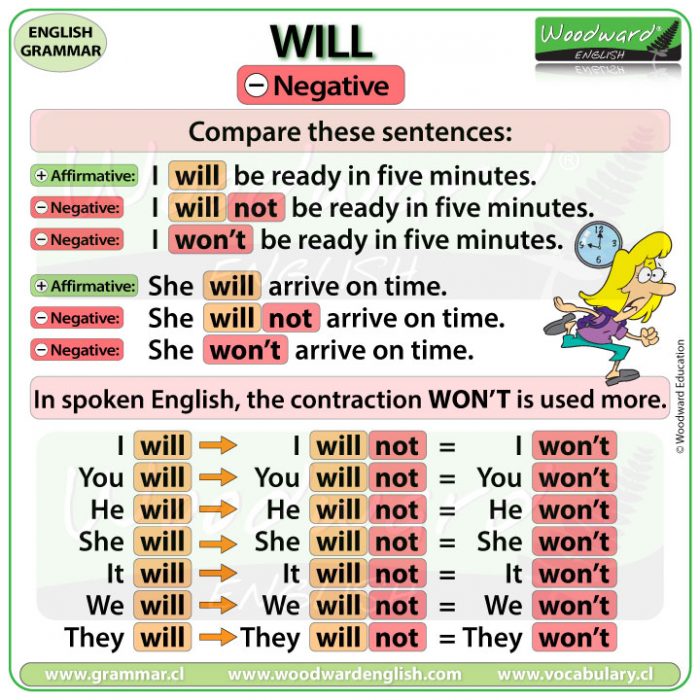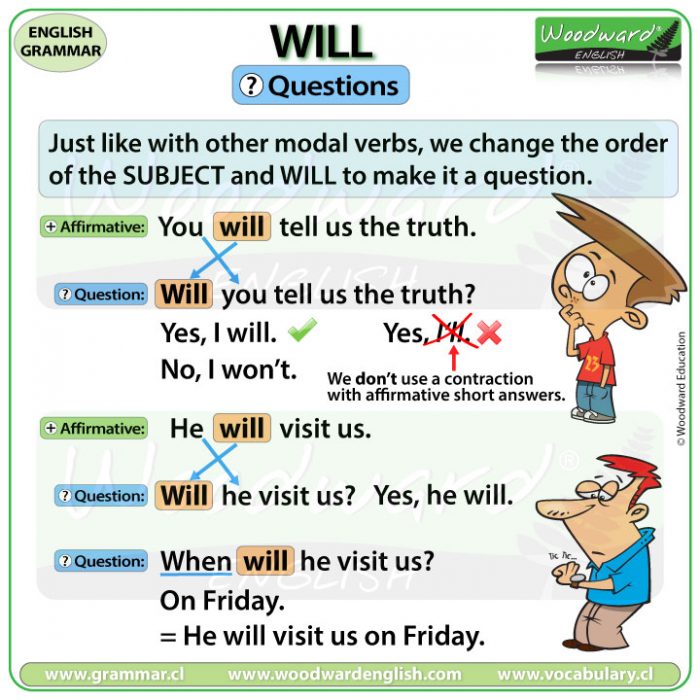WILL – English Grammar Lesson
In general, WILL is used to talk about the future.
- I will help you tomorrow. (Tomorrow is in the future)
- I think we will win on Saturday. (Saturday is a day in the future)
- We will see more uses of the word WILL in a moment. (It is coming in the near future)
Let’s look at how to create sentences and questions with WILL.
Affirmative Sentences with WILL
WILL is a modal verb. This means it follows the same rules as the other modal verbs.
It only has one form for each subject:
- I will
- You will
- He will
- She will
- It will
- We will
- They will
The word WILL doesn’t change.
You cannot say: He wills … ❌ or She wills … ❌
No! … There is no S at the end of WILL.
He will … ✅ She will … ✅
After WILL we have the base form of the infinitive.
This is the Infinitive without TO at the beginning.
Instead of TO GO, just GO.
Instead of TO STUDY, just STUDY.
Instead of TO SPEAK, just SPEAK is used.
We don’t say: I will TO go. ❌
No, this is NOT correct.
We use the base form of TO GO which is without TO.
You say: You will go. ✅
We don’t say: He will goes. ❌
No, this is NOT correct.
We have the infinitive (TO GO) without TO at the beginning.
You say: He will go. ✅
Let’s look at some example sentences:
- I will go there tomorrow.
- You will go there on Friday.
- He will go there next week.
- She will go there next month.
- It will go there next year.
- We will go there later.
- They will go there soon.
You can see that in these sentences GO is used after WILL for all subjects.
Contractions with WILL
In spoken English, a contraction of WILL is often used.
- I will ➡️ I’ll
- you will ➡️ you’ll
- he will ➡️ he’ll
- she will ➡️ she’ll
- it will ➡️ it’ll
- we will ➡️ we’ll
- they will ➡️ they’ll
Example sentences with contractions:
- I will go there tomorrow. ➡️ I’ll go there tomorrow.
- We will see you later. ➡️ We’ll see you later.
- He will help you soon. ➡️ He’ll help you soon.

Negative Sentences with WILL
To create a negative sentence with WILL, we just add NOT directly after it.
I will (affirmative) becomes I will not (negative)
Let’s look at the rest of the subjects.
Affirmative ➡️ Negative
- I will ➡️ I will not
- You will ➡️ You will not
- He will ➡️ He will not
- She will ➡️ She will not
- It will ➡️ It will not
- We will ➡️ We will not
- They will ➡️ They will not
BUT, in spoken English, the contraction WON’T is used more than WILL NOT.
- I will not = I won’t
- You will not = You won’t
- He will not = He won’t
- She will not = She won’t
- It will not = It won’t
- We will not = We won’t
- They will not = They won’t
Compare these sentences:
- I will be ready in five minutes. (affirmative)
- I will not be ready in five minutes. (negative)
- I won’t be ready in five minutes. (negative – more in spoken English)
- She will arrive on time. (affirmative)
- She will not arrive on time. (negative)
- She won’t arrive on time. (negative – more in spoken English)
See our lesson about the difference between ON TIME and IN TIME.
More examples of negative sentences using WON’T
- He won’t listen to me.
- She won’t find it funny.
- I’m sorry I won’t be at your party.
- It won’t hurt if you stay calm.
- We won’t finish this by the end of the day.
- They won’t accept the offer.
- Don’t worry, I won’t tell anyone.

Questions with WILL
Just like with other modal verbs, we change the order of the SUBJECT and WILL to make it a question.
- You will go there tomorrow.
This is an affirmative sentence.
In order to make it a question, we change the order of the subject (YOU) and WILL. It becomes:
- Will you go there tomorrow?
More examples:
- They will be busy. (affirmative)
- Will they be busy? (question)
- He will visit us. (affirmative)
- Will he visit us? (question)
- You will tell us the truth. (affirmative)
- Will you tell us the truth? (question)
How can you answer a question with WILL?
For short answers, you can use: Yes, I will … OR … No, I won’t.
BUT, we don’t use a contraction with affirmative short answers.
- Will you tell us the truth?
- Yes, I’ll. ❌ (This is NOT correct)
- Yes, I will. ✅ (This is correct)
Another example:
- Will you come with me? Yes, I will. / No, I won’t.
(You cannot say: Yes, I’ll. ❌ – We don’t use a contraction with affirmative short answers.)
Look at this question:
- Will he visit us?
A possible answer is: Yes, he will
BUT, if we want to know the time it will happen, then we can use the question word WHEN at the beginning:
- When will he visit us?
Since this is not a yes/no question, our answer needs to be different.
One possible response is: On Friday.
This means: He will visit us on Friday.
We don’t need to say the whole sentence and it would sound repetitive.
Now look at this question:
- Do you think she will get angry?
Notice the order of subject + will. (Do you think SHE WILL get angry?)
That is because the first part of the sentence “Do you…?” makes it a question so we don’t change the order of the subject and will.
You can answer: Yes, I do … or No, I don’t
BUT, our short answer can also contain WILL if you want to use SHE as the subject:
Yes, she will / No, she won’t.

Question Tags with WILL
WILL and WON’T can also be used in question tags.
- You won’t tell Mum, will you?
- He will arrive on time, won’t he?
See our lesson about Question Tags in English.
In our next lesson, we will look at the different uses of WILL and will also compare WILL vs. GOING TO. (Coming next week)
I hope you found this grammar lesson about WILL useful. If you did, please let other people know about it.
